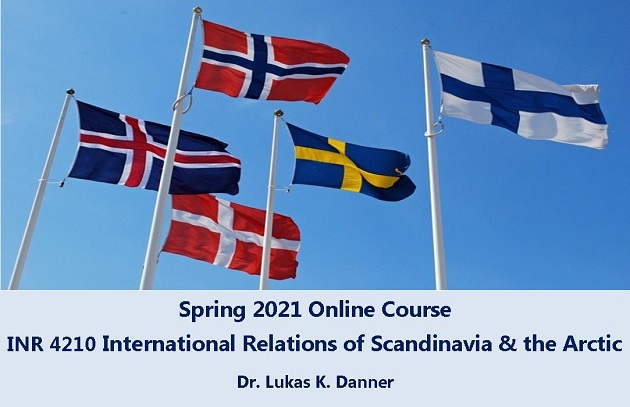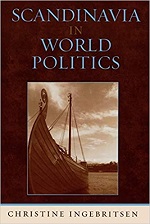
Course Description and Purpose
This course examines the foreign policies and current foreign affairs issues in Scandinavia as well as the rising importance of the Arctic in global politics. As a way of introduction, the relevant underlying International Relations theories, including Small States theory, as well as history of Scandinavian international relations since the Napoleonic Wars will be surveyed.
The focus of the course will be on the international relations of the individual Nordic states (Iceland, Norway, Denmark, Sweden, Finland) as well as the interplay with the European Union as either member states (Sweden, Denmark, Finland) or non-member states (Iceland, Norway), with NATO as member (Iceland, Norway, Denmark) and partner countries (Sweden, Finland), within the European Economic Area (all), and with the Nordic and Arctic Councils (all).
Students will familiarize themselves with the general history of European and Nordic integration, and current EU foreign policy-making structures and institutions. The evolution of Europe as a coherent actor, and the tensions between Scandinavian member states and the other EU members in the pursuit of global influence through the EU will be highlighted, e.g., in issues such as asylum/ refugee policies or environmental policies.
As an integral part of the Scandinavian states, the Arctic will be explored as a quickly rising focus of global politics, especially also in the context of the Arctic Council, the EU’s policy toward the Arctic, as a geopolitically important region for international security in an age when Russia and China eye influence in the Arctic, and—perhaps most pressingly—in the context of climate change and global warming.
Course Objectives
Students will be able to:
- Understand and compare Scandinavian contemporary foreign policies.
- Discuss the basic common history of Scandinavian nations.
- Analyze current common transnational issues faced by the Nordic states and the role the
- EU, NATO, Nordic Council, and Arctic Council play therein.
- Discuss topics directly related to important questions of Arctic affairs.
- Evaluate the rising importance of the Arctic in global politics.
- Analyze current Scandinavian and Arctic international relations through a theoretical lens.
- Use college-level research and writing skills when formulating complex arguments.
Textbook and Course Materials

Scandinavia in World Politics
Christine Ingebritsen,
Scandinavia in World Politics
(Lanham, MD: Rowman & Littlefield, 2006).
ISBN-13: 978-0-7425-0966-5.
SPRING 2021
- Classes begin: January 11, 2021
- Classes end: April 24, 2021
Online Course
Instructor:
Dr. Lukas K. Danner
Research Associate, Miami-Florida Jean Monnet European Center of Excellence
Honorary Research Fellow, East Asia Security Centre, Bond University
Lecturer, Florida International University
_____________________________________________________________________________________________
► For more information & Syllabus, click here
► To view flyer and instructor welcome, click here
_____________________________________________________________________________________________